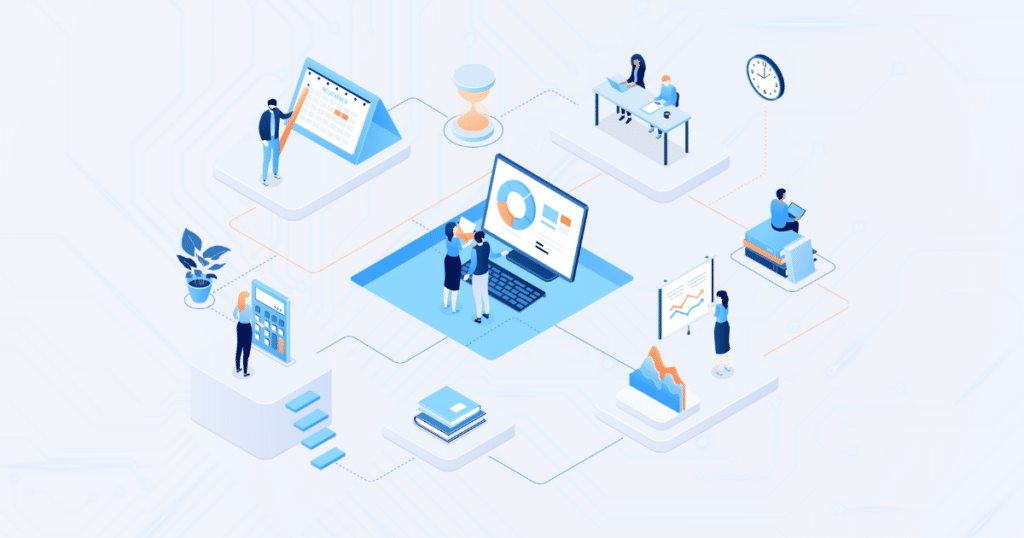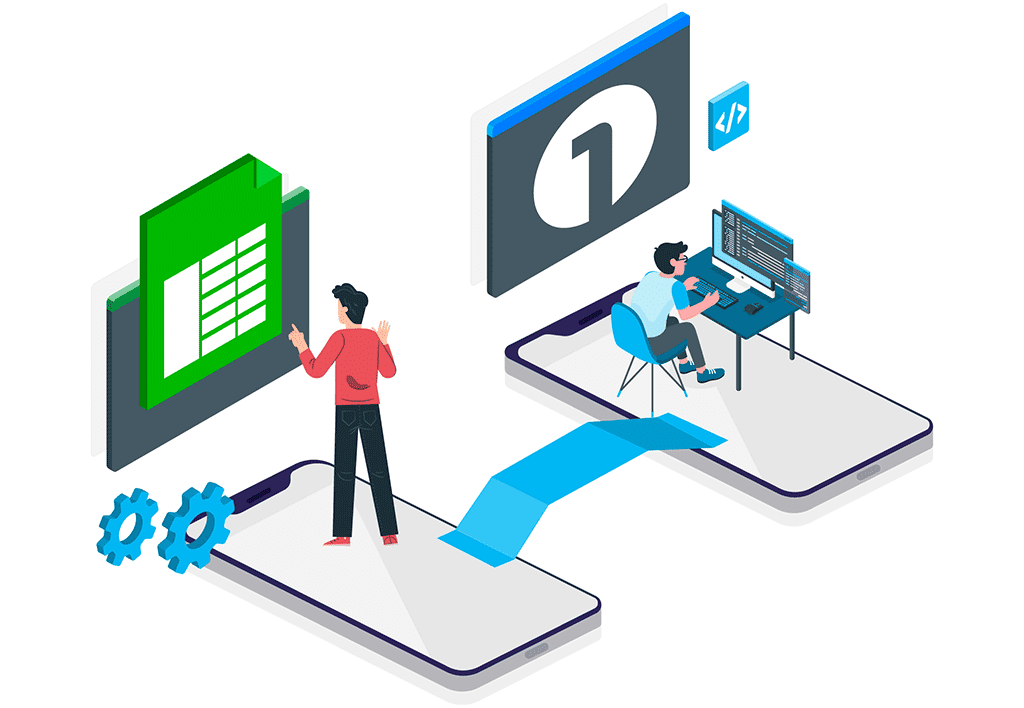Demystifying Business Management Software : Comprehensive Guide for a Successful Business.

Business management software like Codeless ONE is pivotal in helping organizations streamline their operations, improve efficiency, and achieve their goals. However, not all software solutions fit your needs, and choosing the right one can be critical. By understanding the following key elements, you can make an informed decision and find a solution that aligns with your organization’s unique needs.
What are the essential features of Business Management Software?
1. Extensive Functionality:
Assess the fundamental capabilities of the software and verify its compatibility with the specific needs of your organization. Take into account essential aspects such as assigning tasks, resource management, project management, customer relationship management (CRM), financial management, inventory tracking, human resources, and reporting capabilities. Prioritize software solutions that provide a wide range of features to cater to your requirements comprehensively.
2. Intuitive User Interface:
A user-friendly interface is vital for ensuring the smooth adoption and usability of the software. Look for business management tool that offers a clean and intuitive interface, allowing users to navigate seamlessly through different functionalities. A well-designed user interface minimizes the learning curve and enhances overall productivity.
3. Customization and Scalability:
Business needs evolve over time, so it’s crucial to choose a software solution that can adapt and scale with your organization. Look for a system that offers customization options, allowing you to tailor it to your unique workflows and processes. Additionally, consider the software’s scalability to accommodate growth and future expansion.
4. Robust Reporting and Analytics:
Access to accurate and insightful data is vital for making informed business decisions. Look for a software solution that provides robust reporting and analytics features. The ability to generate customizable reports, track key performance indicators (KPIs), and gain actionable insights will empower your organization to monitor progress, identify trends, and make data-driven decisions.
5. Security and Data Protection:
Safeguarding sensitive data should be a top priority when choosing business management platform. Ensure that the software role based access controls, so that your employees have access only to information that they need.
6. Artificial intelligence (AI) capability:
AI capability empowers businesses to develop innovative and competitive solutions that drive growth and success. Custom solutions can be built in just few clicks that saves a lot of time.
What is the use of a Business Management Software?
In today’s era is difficult for businesses to survive without a management tool. It empowers organizations in following ways:
1. Automation of Repetitive Tasks:
One of the significant advantages of business management software is its ability to automate repetitive tasks. Manual processes, such as data entry, report generation, and invoicing, can be automated, saving time and minimizing errors. By reducing manual workload, your team can focus on more strategic and value-added activities resulting in increased productivity and efficiency.
2. Enhanced Collaboration and Communication:
Effective communication and collaboration are essential for smooth operations. Business management softwares often includes features like real-time messaging, shared calendars, task assignments, and document sharing. These tools foster collaboration among team members, enabling them to work together seamlessly, exchange information, and stay updated on project progress. With streamlined communication, collaboration becomes more efficient, leading to improved productivity and quicker decision-making.
3. Centralized Data and Information:
Effective communication and collaboration are essential for smooth operations. It includes features like real-time messaging, shared calendars, task assignments, and document sharing. These tools foster collaboration among team members, enabling them to work together seamlessly, exchange information, and stay updated on project progress. With streamlined communication, collaboration becomes more efficient, leading to improved productivity and quicker decision-making.
4. Improved Workflow and Process Management:
Features like workflow and process management should be part of business management platform. These tools enable you to define, automate, and monitor workflows, ensuring that tasks are completed in a structured and efficient manner. By visualizing and optimizing processes, you can identify bottlenecks, eliminate unnecessary steps, and enhance overall efficiency. Workflow management features also provide transparency, accountability, and a clear overview of the status of ongoing projects.
5. Data-Driven Decision Making:
Accurate and up-to-date information is vital for making informed business decisions. Business management applications facilitates data collection, analysis, and reporting, empowering you to make data-driven decisions. Customizable dashboards, real-time reports, and key performance indicators (KPIs) provide valuable insights into various aspects of your operations. With data at your fingertips, you can identify trends, measure performance, and implement strategies to drive continuous improvement.
10 Common Types of Business Management Software for 2023
There are various types of softwares and applications available to cater to different aspects of managing a business. Here are some common types:
1. Comprehensive business management software:
All in one tool like Codeless ONE integrates and manages various business processes and business functions such as finance, human resources, inventory, supply chain, manufacturing, and customer relationship management. It provides a centralized database and streamlines processes across different departments.
2. Customer Relationship Management (CRM) Software:
CRM software manages customer interactions, sales processes, and customer data. It helps businesses track leads, manage customer relationships, automate sales processes, and analyze customer data to improve sales and customer service.
3. Project Management Software:
Project management software helps plan, organize, and track projects from start to finish. It provides tools for time tracking, task management, scheduling, collaboration, resource allocation, and progress tracking, enabling teams to assign tasks, work efficiently and meet project goals.
4. Accounting Software:
Accounting software assists with financial management, including invoicing, bookkeeping, budgeting, financial reporting, and tax management. It simplifies financial processes, ensures accuracy, and provides insights into the financial health of the business.
5. Human Resources (HR) Software:
HR software automates HR processes such as employee onboarding, attendance tracking, payroll management, performance evaluation, benefits administration, and talent management. It helps streamline HR operations and improves employee management.
6. Inventory Management Software:
Inventory management software helps businesses track and manage inventory levels, sales orders, purchase orders, and stock movements. It enables efficient inventory control, prevents stockouts and overstocking, and optimizes resource management and supply chain management.
7. Business Intelligence (BI) Software:
BI software collects, analyzes, and presents data to provide insights and support decision-making. It helps businesses visualize data through dashboards and reports, identify trends, measure key performance indicators, and make data-driven decisions.
8. Collaboration and Communication Tools:
Collaboration and communication tools facilitate team collaboration, document sharing, messaging, video conferencing, and task management. They enable teams to work together effectively, even remotely, improving productivity and communication.
9. Supply Chain Management (SCM) Software:
SCM software focuses on optimizing the supply chain processes, including procurement, inventory management, demand forecasting, logistics, and supplier management. It helps businesses streamline supply chain operations and improve efficiency.
10. Customer Support and Help Desk Software:
Customer support and help desk software streamline customer service operations by managing and tracking customer inquiries, support tickets, and requests. It enables businesses to provide timely and efficient customer support.
Codeless ONE is one such powerful AI powered business management tool that can revolutionize your organization’s operations. Codeless ONE has a collection of more than 100 ready to use business apps that can be customized as per need in minutes. By automating tasks, enhancing collaboration, centralizing data, and enabling data-driven decision-making, this software streamlines your operations and boosts overall efficiency. Embrace the capabilities of business management software and unlock your business’s potential for growth, productivity, and success. Stay ahead of the competition by investing in Codeless ONE and reaping the benefits of streamlined operations.
Manage business with Codeless ONE.
Book a free personalized demo now.





